教科版(广州)英语六年级下册 Unit 7 It's the polite thing to do 讲义(无答案)
文档属性
| 名称 | 教科版(广州)英语六年级下册 Unit 7 It's the polite thing to do 讲义(无答案) |
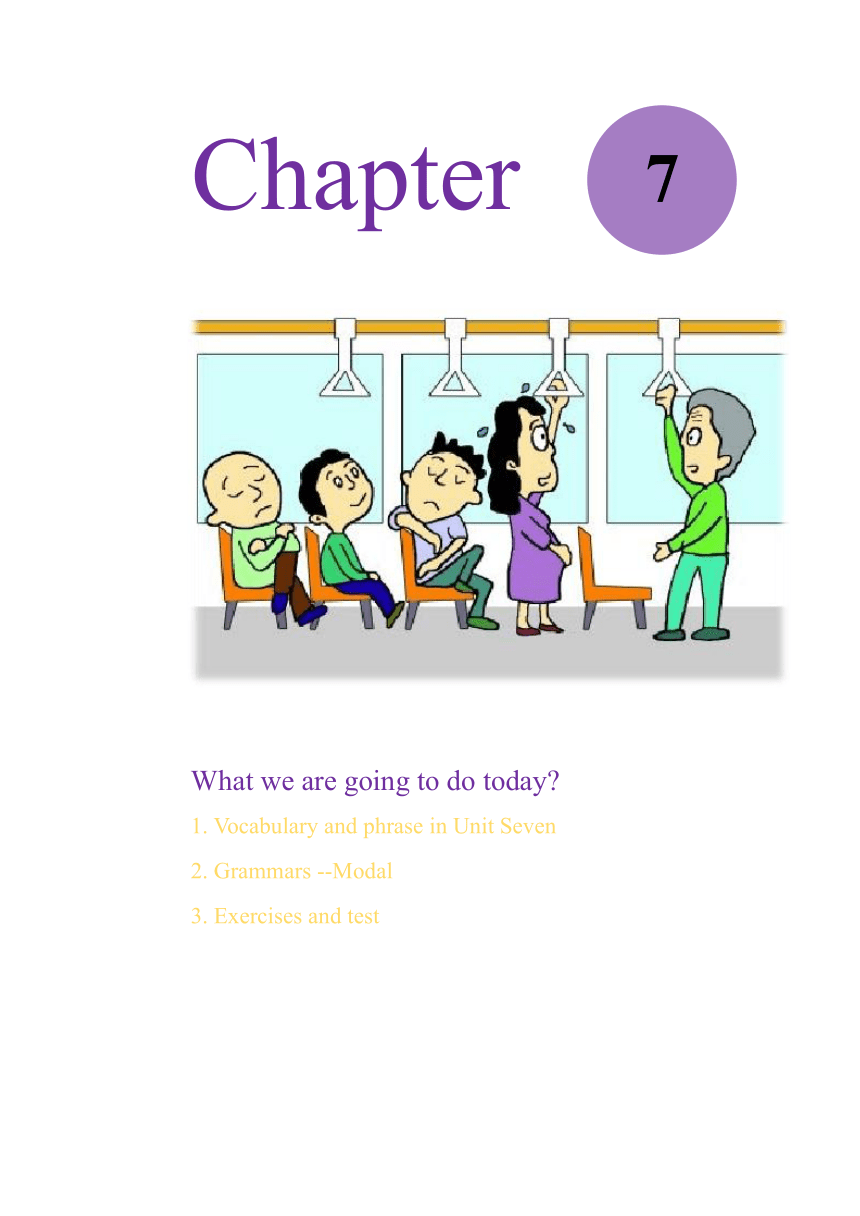
|
|
| 格式 | doc | ||
| 文件大小 | 1.5MB | ||
| 资源类型 | 教案 | ||
| 版本资源 | 教科版(广州) | ||
| 科目 | 英语 | ||
| 更新时间 | 2022-05-12 18:11:01 | ||
图片预览

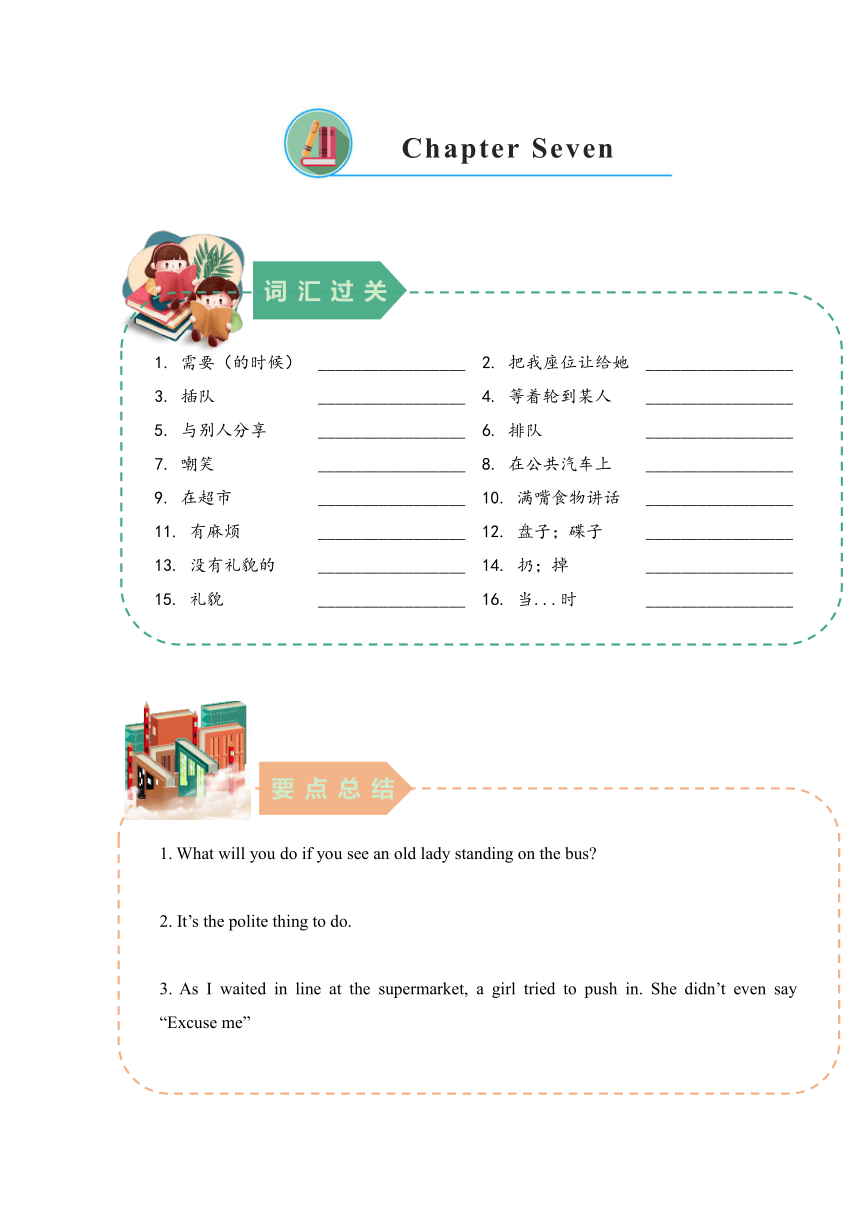
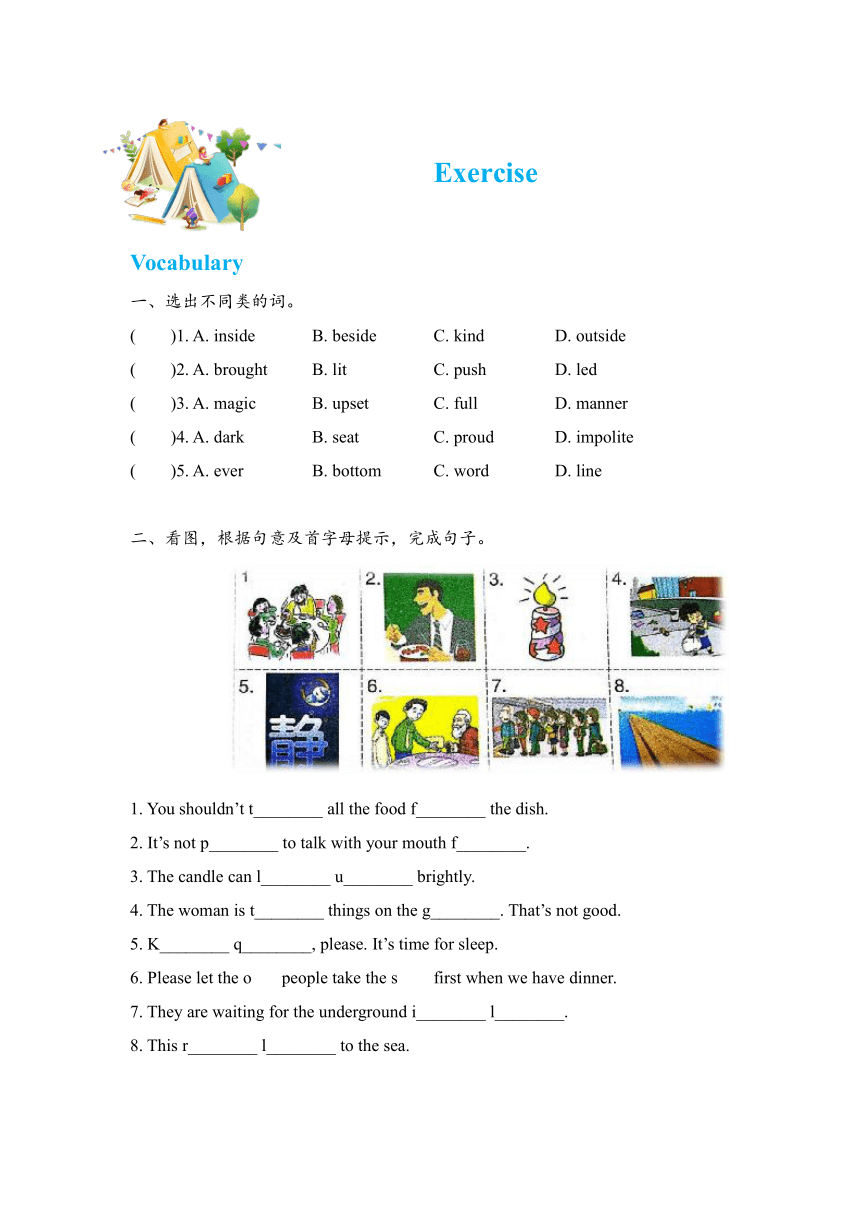
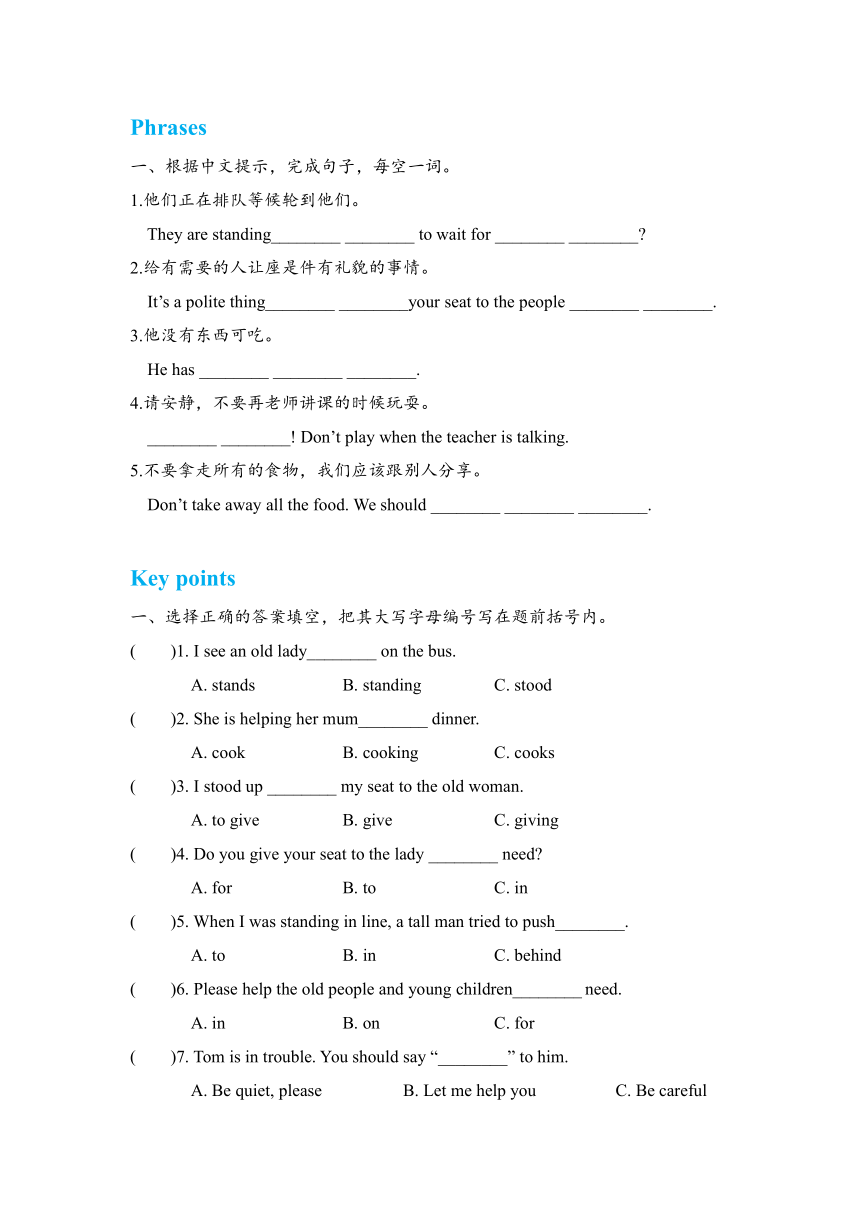
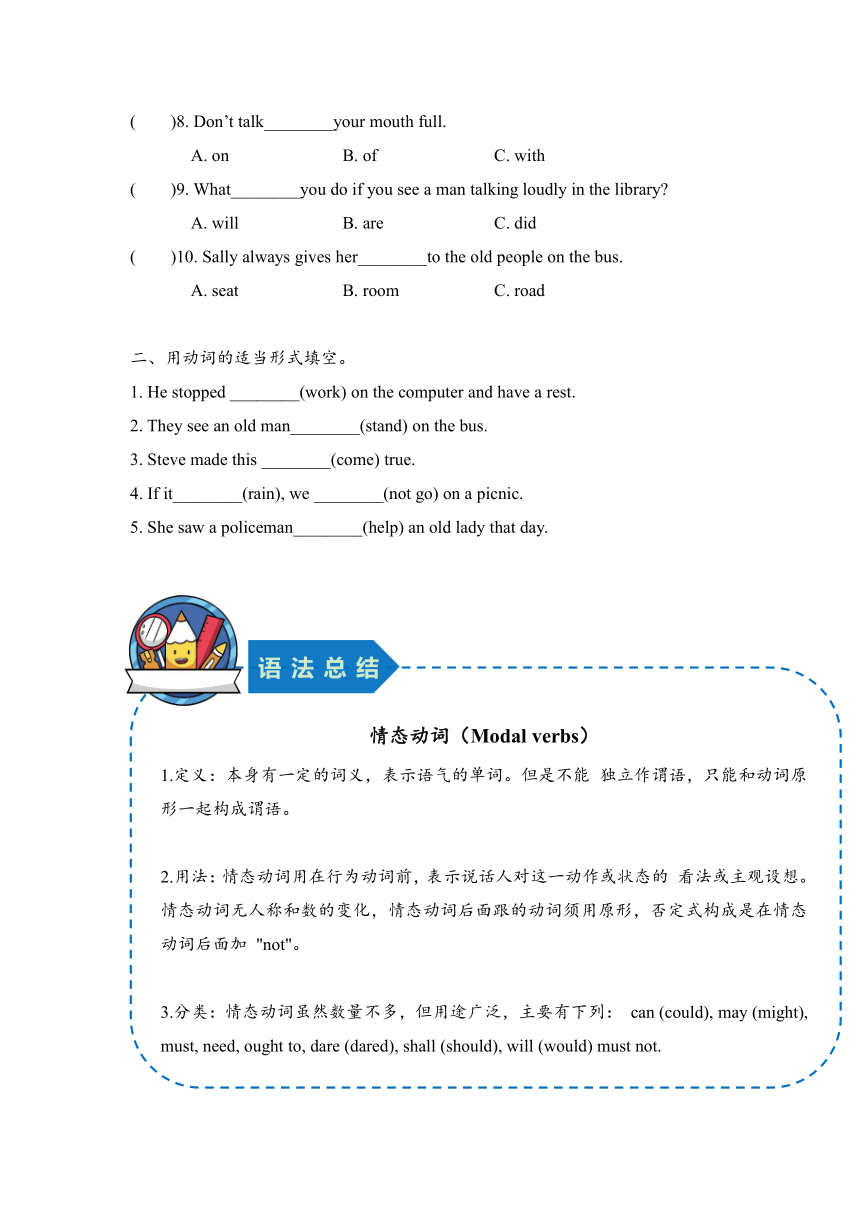
文档简介
Chapter
What we are going to do today
1. Vocabulary and phrase in Unit Seven
2. Grammars --Modal
3. Exercises and test
Exercise
Vocabulary
一、选出不同类的词。
( )1. A. inside B. beside C. kind D. outside
( )2. A. brought B. lit C. push D. led
( )3. A. magic B. upset C. full D. manner
( )4. A. dark B. seat C. proud D. impolite
( )5. A. ever B. bottom C. word D. line
二、看图,根据句意及首字母提示,完成句子。
1. You shouldn’t t________ all the food f________ the dish.
2. It’s not p________ to talk with your mouth f________.
3. The candle can l________ u________ brightly.
4. The woman is t________ things on the g________. That’s not good.
5. K________ q________, please. It’s time for sleep.
6. Please let the o people take the s first when we have dinner.
7. They are waiting for the underground i________ l________.
8. This r________ l________ to the sea.
Phrases
一、根据中文提示,完成句子,每空一词。
1.他们正在排队等候轮到他们。
They are standing________ ________ to wait for ________ ________
2.给有需要的人让座是件有礼貌的事情。
It’s a polite thing________ ________your seat to the people ________ ________.
3.他没有东西可吃。
He has ________ ________ ________.
4.请安静,不要再老师讲课的时候玩耍。
________ ________! Don’t play when the teacher is talking.
5.不要拿走所有的食物,我们应该跟别人分享。
Don’t take away all the food. We should ________ ________ ________.
Key points
一、选择正确的答案填空,把其大写字母编号写在题前括号内。
( )1. I see an old lady________ on the bus.
A. stands B. standing C. stood
( )2. She is helping her mum________ dinner.
A. cook B. cooking C. cooks
( )3. I stood up ________ my seat to the old woman.
A. to give B. give C. giving
( )4. Do you give your seat to the lady ________ need
A. for B. to C. in
( )5. When I was standing in line, a tall man tried to push________.
A. to B. in C. behind
( )6. Please help the old people and young children________ need.
A. in B. on C. for
( )7. Tom is in trouble. You should say “________” to him.
A. Be quiet, please B. Let me help you C. Be careful
( )8. Don’t talk________your mouth full.
A. on B. of C. with
( )9. What________you do if you see a man talking loudly in the library
A. will B. are C. did
( )10. Sally always gives her________to the old people on the bus.
A. seat B. room C. road
二、用动词的适当形式填空。
1. He stopped ________(work) on the computer and have a rest.
2. They see an old man________(stand) on the bus.
3. Steve made this ________(come) true.
4. If it________(rain), we ________(not go) on a picnic.
5. She saw a policeman________(help) an old lady that day.
【专题一】:can和could的用法
【例1】Can you lift this heavy box (体力)
【解析】表示能力(体力、知识、技能)
【练习】
1.Mary___________speak three languages.(知识)
2. ___________you skate (技能)
此时可用be able to代替。Can只有一般现在时和一般过去式;而be able to则有更多的时态。
I’ll not be able to come this afternoon.
当表示“经过努力才得以做成功某事”时应用be able to,不能用Can。
【例2】
-----Can I go now
----- Yes, you can. / No, you can’t.
【解析】表示请求和允许。此时可与may互换。在疑问句中还可用could,might代替,不是过去式,只是语气更委婉,不能用于肯定句和答语中。
【练习】
---- ___________I come to see you tomorrow
---- Yes, you___________.
----No, you___________ /I’m afraid not.
【例3】Can this be true
【解析】表示推测(惊讶、怀疑、不相信的态度),用于疑问句、否定句和感叹句中。
【练习】
This___________be done by him.
How___________this be true
【专题二】may和might的用法:
【例1】----Might/ May I smoke in this room
---- No, you mustn’t.
【解析】表示请求和允许。might比may语气更委婉,而不是过去式。否定回答时可用can’t或mustn’t,表示“不可以,禁止”。用May I... 征徇对方许可时比较正式和客气,而用Can I... 在口语中更常见。
【练习】
----___________I take this book out of the room
---- Yes, you___________. No, you
【例2】He may /might be very busy now.
【解析】表示推测、可能性(不用于疑问句)。might非过去式,它所表示的可能性比may小。
【练习】
1.Your mother___________not know the truth.
2.He ___________very busy now.他现在可能很忙。
【专题三】must和have to的用法:
【例 1】The man___________be our teacher。那个人一定是我们的老师。
【例 2】I___________study hard because of my dream .为了我的梦想我必须努力学习。
【例 3】1.You___________come in time.你必须准时过来
【解析】:must表示必须、必要。表示主观对事物的推测时,意为想必、一定,只用于肯定句中;表推测时,情态动词与动词原形(常为be动词)连用。而have to强调客观需要。
【练习】:
1.Her play is boring, I___________go now.
2.Your mother___________be waiting for you now.
3.I___________go home, because my father is ill.
【例4】---Must we hand in our exercise books today
---Yes, you___________.
---No, you___________.
【解析】:在回答由must引出的问句时,如果是否定的,不能用mustn’t,而用needn’t,don’t have to.must是说话人的主观看法,而have to则强调客观需要。
【练习】:
---Must he go to school now
---Yes, he___________.
---No, he___________.
【专题四】should的用法
【例1】I should help her because she is in trouble.
【解析】should表示应该
【练习】
You___________take care of the baby.
【例2】You should go to class right away.
【解析】表示劝告、建议和命令。在疑问句中常用should。
【练习】___________I open the window?
【专题五】will和would的用法
【例1】 I will do anything for you.
【解析】表示询问,请求,将要。
【练习】
1. ___________you pass me the book
2.She___________go to the library.
【例2】Would you tell me the way to the school
【解析】表示过去的意愿或委婉提问
Exercise
一、用适当的情态动词填空。
1. Must I borrow the book with my ID card No, you___________.
2. ___________I use your car Yes, you___________.
3. ___________I go home now No, you___________stay here and wait for the teacher.
4. My mother is ill. I___________stay at home and look after her.
5. I___________send an email to my friend.
6. You___________take more exercise.
7. ___________you tell me how to get to the Park
8. We___________help each other.
9. ___________you like to go fishing with me
10. ___________we play foot ball this afternoon
二、按要求改写句子。
1. I can run fast.(否定句)
I___________ ___________fast.
2. You must return the book now.(一般疑问句)
___________I return the book now No,you___________.
3. He can play basketball well.(一般疑问句)
___________He___________basketball well
4. They must take the books out of the room.(否定句)
They___________ ___________ the books out of the room.
5. He will get up early.(否定句)
He ___________ ___________get up early.
三、选择题
( )1. Lucy should___________her homework now.
A. finishes B. finishing C. finished D. finish
( )2. My mother would___________back soon.
A. came B. comes C. come D. will come
( )3. Could you___________ me a hand.
A. giving B. gives C. given D. give
( )4. Should I___________now.
A. started B. starting C. start D. starts
( )5. ___________I take this one
A. Could B. Will C. Are D. Do
( )6. -- Can you speak English
-- No, I___________.
A. mustn't B. can't C. couldn't D. may not
( )7. You___________go and see a doctor because you had a fever(发烧).
A. could B. might C. should D. would
( )8. Jim___________come tonight, but he isn't very sure yet.
A. should B. might C. would D. should
( )9. The children___________play football on the road.
A. couldn't B. could C. must D. mustn't
( )10. -- Can I take this book out.
-- No, you ___________.
A. must not B. could not C. will not D. aren't
( )11. I___________like to go with you.
A. could B. would C. should D. will
( )12. She is bleeding (流血). She___________go to hospital quickly.
A. could B. would C. should D. will
Exercise
一、选择正确的答案填空,把其大写字母编号写在提前的括号内。
( )1. The child likes________with an iPad.
A. play B. playing C. plays
( )2. The girl knows the table________in England.
A. manners B. colours C. sign
( )3. You mustn’t________things on the ground when you are in the public place.
A. throw B. threw C. throwing
( )4. We should always give our seat to people in need. It’s the________to do.
A. impolite thing B. polite things C. polite thing
( )5. People________nice to you if you are nice to them.
A. will be B. were C. are
( )6. What will you do if you see an old man________on the underground
A. stands B. stood C.standing
( )7. Peter is________English boy.
A. a B. an C. the
( )8. Look at that girl. How________.
A. pretty she is B. pretty is she C. she is pretty
( )9. The children are________all the food from the dish.
A. take B. takes C. taking
二、回答问题。
1. Do you wait in line at supermarket
___________________________________
2. What will you do when you see a child in trouble
___________________________________
3. Do you always throw things on the ground
___________________________________
4. What will you say if someone helps you
___________________________________
5. What will you say if you do something bad to others
___________________________________
三、阅读短文,根据短文内容选择正确的答案。
Long ago, many people lived on farms. Sometimes farmers would need a new barn(谷仓). So they asked their neighbours(邻居) to come and help build it. This was called a barn raising. People from all around came a long way to a barn raising. Usually the whole family got to go.
Everyone worked together to build a barn. It was a lot of hard work because it was a very heavy job to build a big barn. Some people, mostly women or the old, could not help build the barn, but they had other jobs, like watching the children, cooking all the food. Everyone on the farm was busy.
Why neighbors helped at a barn raising First, people wanted to help those people in need. If they could help, they would. Their help was a gift to their neighbors. Also, building a barn was hard work. The job was easier when more people came together. Farmers loved to travel a long way to help their neighbours with the hard jobs. Finally, and the most importantly, the neighbors knew that they might need a new barn someday. If they helped a farmer build a barn, the farmer would return the same work someday.
( )1. What is called a barn raising
A. Farmers lived far away.
B. Farmers asked the neighbours to come and build a new barn.
C. Farmers came a long way to build a new barn.
( )2. Who would go for a barn raising
A. Only the farmers.
B. The woman and the old.
C. The whole family.
( )3. What did the women and the old do for a barn raising
A. Watching children. B. Cooking all the food. C. A and C.
( )4. Why did neighbours love to help at a barn raising
A. They could help each other with big heavy jobs.
B. It’s an easy job.
C. They wanted to meet friends.
( )5. What is NOT right about a barn raising
A. People wanted to help those people in need.
B. They travelled to other farms for fun and help.
C. Building a barn was easier when more people came together.
四、阅读短文,判断下列句子是否符合短文内容,如符合,写“T”,否则写“F”。
Being polite is very important. If you are polite to others, they will be polite to you.
In English there are many workds to show you are polite. Many visitors don’t know when to use “please”. When they go into a cafe and say “A coffee.” or “I want a coffee.” These might be OK for the English people. But they can be very impolite to an English ear if you are a visitor. So adding a simple “please” would make it better. “A coffee, please.” Or “I would like a coffee, please.” will make you a polite visitor.
In fact, you can be even more polite: “Sorry, could you tell me the way to Oxford Street, please ” Sorry, could you tell me your name again, please ” It’s very common to start a request(请求) with the word “sorry”.
If you ask for help, try “I’m sorry to bother you.” or “But could you possibly help me, please ” And you might say to a friend “Hey, John. Lend(借) me$100, will you ” But you couldn’t say this to somebody you do not know well.
( )1. It’s OK for a visitor to say “I want a coffee.” when they are in a cafe.
( )2. “I would like a coffe, please.” is a polite way to say.
( )3. “Sorry, could you tell me your name again, please ” is an impolite way to say.
( )4. In England, people seldom start a request with the word “sorry”.
( )5. You can say to a friend “Hey, Xiaoling. Lend me 100 yuan.”
7
Chapter Seven
词汇过关
1. 需要(的时候) _________________ 2. 把我座位让给她 _________________
3. 插队 _________________ 4. 等着轮到某人 _________________
5. 与别人分享 _________________ 6. 排队 _________________
7. 嘲笑 _________________ 8. 在公共汽车上 _________________
9. 在超市 _________________ 10. 满嘴食物讲话 _________________
11. 有麻烦 _________________ 12. 盘子;碟子 _________________
13. 没有礼貌的 _________________ 14. 扔;掉 _________________
15. 礼貌 _________________ 16. 当...时 _________________
1. What will you do if you see an old lady standing on the bus
2. It’s the polite thing to do.
3. As I waited in line at the supermarket, a girl tried to push in. She didn’t even say “Excuse me”
要点总结
语法总结
情态动词(Modal verbs)
1.定义:本身有一定的词义,表示语气的单词。但是不能 独立作谓语,只能和动词原形一起构成谓语。
2.用法:情态动词用在行为动词前,表示说话人对这一动作或状态的 看法或主观设想。情态动词无人称和数的变化,情态动词后面跟的动词须用原形,否定式构成是在情态动词后面加 "not"。
3.分类:情态动词虽然数量不多,但用途广泛,主要有下列: can (could), may (might), must, need, ought to, dare (dared), shall (should), will (would) must not.
What we are going to do today
1. Vocabulary and phrase in Unit Seven
2. Grammars --Modal
3. Exercises and test
Exercise
Vocabulary
一、选出不同类的词。
( )1. A. inside B. beside C. kind D. outside
( )2. A. brought B. lit C. push D. led
( )3. A. magic B. upset C. full D. manner
( )4. A. dark B. seat C. proud D. impolite
( )5. A. ever B. bottom C. word D. line
二、看图,根据句意及首字母提示,完成句子。
1. You shouldn’t t________ all the food f________ the dish.
2. It’s not p________ to talk with your mouth f________.
3. The candle can l________ u________ brightly.
4. The woman is t________ things on the g________. That’s not good.
5. K________ q________, please. It’s time for sleep.
6. Please let the o people take the s first when we have dinner.
7. They are waiting for the underground i________ l________.
8. This r________ l________ to the sea.
Phrases
一、根据中文提示,完成句子,每空一词。
1.他们正在排队等候轮到他们。
They are standing________ ________ to wait for ________ ________
2.给有需要的人让座是件有礼貌的事情。
It’s a polite thing________ ________your seat to the people ________ ________.
3.他没有东西可吃。
He has ________ ________ ________.
4.请安静,不要再老师讲课的时候玩耍。
________ ________! Don’t play when the teacher is talking.
5.不要拿走所有的食物,我们应该跟别人分享。
Don’t take away all the food. We should ________ ________ ________.
Key points
一、选择正确的答案填空,把其大写字母编号写在题前括号内。
( )1. I see an old lady________ on the bus.
A. stands B. standing C. stood
( )2. She is helping her mum________ dinner.
A. cook B. cooking C. cooks
( )3. I stood up ________ my seat to the old woman.
A. to give B. give C. giving
( )4. Do you give your seat to the lady ________ need
A. for B. to C. in
( )5. When I was standing in line, a tall man tried to push________.
A. to B. in C. behind
( )6. Please help the old people and young children________ need.
A. in B. on C. for
( )7. Tom is in trouble. You should say “________” to him.
A. Be quiet, please B. Let me help you C. Be careful
( )8. Don’t talk________your mouth full.
A. on B. of C. with
( )9. What________you do if you see a man talking loudly in the library
A. will B. are C. did
( )10. Sally always gives her________to the old people on the bus.
A. seat B. room C. road
二、用动词的适当形式填空。
1. He stopped ________(work) on the computer and have a rest.
2. They see an old man________(stand) on the bus.
3. Steve made this ________(come) true.
4. If it________(rain), we ________(not go) on a picnic.
5. She saw a policeman________(help) an old lady that day.
【专题一】:can和could的用法
【例1】Can you lift this heavy box (体力)
【解析】表示能力(体力、知识、技能)
【练习】
1.Mary___________speak three languages.(知识)
2. ___________you skate (技能)
此时可用be able to代替。Can只有一般现在时和一般过去式;而be able to则有更多的时态。
I’ll not be able to come this afternoon.
当表示“经过努力才得以做成功某事”时应用be able to,不能用Can。
【例2】
-----Can I go now
----- Yes, you can. / No, you can’t.
【解析】表示请求和允许。此时可与may互换。在疑问句中还可用could,might代替,不是过去式,只是语气更委婉,不能用于肯定句和答语中。
【练习】
---- ___________I come to see you tomorrow
---- Yes, you___________.
----No, you___________ /I’m afraid not.
【例3】Can this be true
【解析】表示推测(惊讶、怀疑、不相信的态度),用于疑问句、否定句和感叹句中。
【练习】
This___________be done by him.
How___________this be true
【专题二】may和might的用法:
【例1】----Might/ May I smoke in this room
---- No, you mustn’t.
【解析】表示请求和允许。might比may语气更委婉,而不是过去式。否定回答时可用can’t或mustn’t,表示“不可以,禁止”。用May I... 征徇对方许可时比较正式和客气,而用Can I... 在口语中更常见。
【练习】
----___________I take this book out of the room
---- Yes, you___________. No, you
【例2】He may /might be very busy now.
【解析】表示推测、可能性(不用于疑问句)。might非过去式,它所表示的可能性比may小。
【练习】
1.Your mother___________not know the truth.
2.He ___________very busy now.他现在可能很忙。
【专题三】must和have to的用法:
【例 1】The man___________be our teacher。那个人一定是我们的老师。
【例 2】I___________study hard because of my dream .为了我的梦想我必须努力学习。
【例 3】1.You___________come in time.你必须准时过来
【解析】:must表示必须、必要。表示主观对事物的推测时,意为想必、一定,只用于肯定句中;表推测时,情态动词与动词原形(常为be动词)连用。而have to强调客观需要。
【练习】:
1.Her play is boring, I___________go now.
2.Your mother___________be waiting for you now.
3.I___________go home, because my father is ill.
【例4】---Must we hand in our exercise books today
---Yes, you___________.
---No, you___________.
【解析】:在回答由must引出的问句时,如果是否定的,不能用mustn’t,而用needn’t,don’t have to.must是说话人的主观看法,而have to则强调客观需要。
【练习】:
---Must he go to school now
---Yes, he___________.
---No, he___________.
【专题四】should的用法
【例1】I should help her because she is in trouble.
【解析】should表示应该
【练习】
You___________take care of the baby.
【例2】You should go to class right away.
【解析】表示劝告、建议和命令。在疑问句中常用should。
【练习】___________I open the window?
【专题五】will和would的用法
【例1】 I will do anything for you.
【解析】表示询问,请求,将要。
【练习】
1. ___________you pass me the book
2.She___________go to the library.
【例2】Would you tell me the way to the school
【解析】表示过去的意愿或委婉提问
Exercise
一、用适当的情态动词填空。
1. Must I borrow the book with my ID card No, you___________.
2. ___________I use your car Yes, you___________.
3. ___________I go home now No, you___________stay here and wait for the teacher.
4. My mother is ill. I___________stay at home and look after her.
5. I___________send an email to my friend.
6. You___________take more exercise.
7. ___________you tell me how to get to the Park
8. We___________help each other.
9. ___________you like to go fishing with me
10. ___________we play foot ball this afternoon
二、按要求改写句子。
1. I can run fast.(否定句)
I___________ ___________fast.
2. You must return the book now.(一般疑问句)
___________I return the book now No,you___________.
3. He can play basketball well.(一般疑问句)
___________He___________basketball well
4. They must take the books out of the room.(否定句)
They___________ ___________ the books out of the room.
5. He will get up early.(否定句)
He ___________ ___________get up early.
三、选择题
( )1. Lucy should___________her homework now.
A. finishes B. finishing C. finished D. finish
( )2. My mother would___________back soon.
A. came B. comes C. come D. will come
( )3. Could you___________ me a hand.
A. giving B. gives C. given D. give
( )4. Should I___________now.
A. started B. starting C. start D. starts
( )5. ___________I take this one
A. Could B. Will C. Are D. Do
( )6. -- Can you speak English
-- No, I___________.
A. mustn't B. can't C. couldn't D. may not
( )7. You___________go and see a doctor because you had a fever(发烧).
A. could B. might C. should D. would
( )8. Jim___________come tonight, but he isn't very sure yet.
A. should B. might C. would D. should
( )9. The children___________play football on the road.
A. couldn't B. could C. must D. mustn't
( )10. -- Can I take this book out.
-- No, you ___________.
A. must not B. could not C. will not D. aren't
( )11. I___________like to go with you.
A. could B. would C. should D. will
( )12. She is bleeding (流血). She___________go to hospital quickly.
A. could B. would C. should D. will
Exercise
一、选择正确的答案填空,把其大写字母编号写在提前的括号内。
( )1. The child likes________with an iPad.
A. play B. playing C. plays
( )2. The girl knows the table________in England.
A. manners B. colours C. sign
( )3. You mustn’t________things on the ground when you are in the public place.
A. throw B. threw C. throwing
( )4. We should always give our seat to people in need. It’s the________to do.
A. impolite thing B. polite things C. polite thing
( )5. People________nice to you if you are nice to them.
A. will be B. were C. are
( )6. What will you do if you see an old man________on the underground
A. stands B. stood C.standing
( )7. Peter is________English boy.
A. a B. an C. the
( )8. Look at that girl. How________.
A. pretty she is B. pretty is she C. she is pretty
( )9. The children are________all the food from the dish.
A. take B. takes C. taking
二、回答问题。
1. Do you wait in line at supermarket
___________________________________
2. What will you do when you see a child in trouble
___________________________________
3. Do you always throw things on the ground
___________________________________
4. What will you say if someone helps you
___________________________________
5. What will you say if you do something bad to others
___________________________________
三、阅读短文,根据短文内容选择正确的答案。
Long ago, many people lived on farms. Sometimes farmers would need a new barn(谷仓). So they asked their neighbours(邻居) to come and help build it. This was called a barn raising. People from all around came a long way to a barn raising. Usually the whole family got to go.
Everyone worked together to build a barn. It was a lot of hard work because it was a very heavy job to build a big barn. Some people, mostly women or the old, could not help build the barn, but they had other jobs, like watching the children, cooking all the food. Everyone on the farm was busy.
Why neighbors helped at a barn raising First, people wanted to help those people in need. If they could help, they would. Their help was a gift to their neighbors. Also, building a barn was hard work. The job was easier when more people came together. Farmers loved to travel a long way to help their neighbours with the hard jobs. Finally, and the most importantly, the neighbors knew that they might need a new barn someday. If they helped a farmer build a barn, the farmer would return the same work someday.
( )1. What is called a barn raising
A. Farmers lived far away.
B. Farmers asked the neighbours to come and build a new barn.
C. Farmers came a long way to build a new barn.
( )2. Who would go for a barn raising
A. Only the farmers.
B. The woman and the old.
C. The whole family.
( )3. What did the women and the old do for a barn raising
A. Watching children. B. Cooking all the food. C. A and C.
( )4. Why did neighbours love to help at a barn raising
A. They could help each other with big heavy jobs.
B. It’s an easy job.
C. They wanted to meet friends.
( )5. What is NOT right about a barn raising
A. People wanted to help those people in need.
B. They travelled to other farms for fun and help.
C. Building a barn was easier when more people came together.
四、阅读短文,判断下列句子是否符合短文内容,如符合,写“T”,否则写“F”。
Being polite is very important. If you are polite to others, they will be polite to you.
In English there are many workds to show you are polite. Many visitors don’t know when to use “please”. When they go into a cafe and say “A coffee.” or “I want a coffee.” These might be OK for the English people. But they can be very impolite to an English ear if you are a visitor. So adding a simple “please” would make it better. “A coffee, please.” Or “I would like a coffee, please.” will make you a polite visitor.
In fact, you can be even more polite: “Sorry, could you tell me the way to Oxford Street, please ” Sorry, could you tell me your name again, please ” It’s very common to start a request(请求) with the word “sorry”.
If you ask for help, try “I’m sorry to bother you.” or “But could you possibly help me, please ” And you might say to a friend “Hey, John. Lend(借) me$100, will you ” But you couldn’t say this to somebody you do not know well.
( )1. It’s OK for a visitor to say “I want a coffee.” when they are in a cafe.
( )2. “I would like a coffe, please.” is a polite way to say.
( )3. “Sorry, could you tell me your name again, please ” is an impolite way to say.
( )4. In England, people seldom start a request with the word “sorry”.
( )5. You can say to a friend “Hey, Xiaoling. Lend me 100 yuan.”
7
Chapter Seven
词汇过关
1. 需要(的时候) _________________ 2. 把我座位让给她 _________________
3. 插队 _________________ 4. 等着轮到某人 _________________
5. 与别人分享 _________________ 6. 排队 _________________
7. 嘲笑 _________________ 8. 在公共汽车上 _________________
9. 在超市 _________________ 10. 满嘴食物讲话 _________________
11. 有麻烦 _________________ 12. 盘子;碟子 _________________
13. 没有礼貌的 _________________ 14. 扔;掉 _________________
15. 礼貌 _________________ 16. 当...时 _________________
1. What will you do if you see an old lady standing on the bus
2. It’s the polite thing to do.
3. As I waited in line at the supermarket, a girl tried to push in. She didn’t even say “Excuse me”
要点总结
语法总结
情态动词(Modal verbs)
1.定义:本身有一定的词义,表示语气的单词。但是不能 独立作谓语,只能和动词原形一起构成谓语。
2.用法:情态动词用在行为动词前,表示说话人对这一动作或状态的 看法或主观设想。情态动词无人称和数的变化,情态动词后面跟的动词须用原形,否定式构成是在情态动词后面加 "not"。
3.分类:情态动词虽然数量不多,但用途广泛,主要有下列: can (could), may (might), must, need, ought to, dare (dared), shall (should), will (would) must not.
同课章节目录
- Module 1 Stories
- Unit 1 Slow and steady wins the race
- Unit 2 Waiting for another hare
- Module 2 Animals
- Unit 3 What animal is it?
- Unit 4 We can save the animals
- Module 3 Famous people
- Unit 5 Dr Sun Yatsen
- Unit 6 Steve Jobs
- Module 4 Good manners
- Unit 7 It's the polite thing to do
- Unit 8 The magic words
- Module 5 Travel abroad
- Unit 9 Where will you go?
- Unit 10 I can't wait to see you
- Module 6 Let's look back
